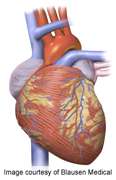Early prophylactic tx beneficial for hypertrophic cardiomyopathy

(HealthDay)—Beta blockers (BBs) are effective as an early prophylactic pharmacologic treatment for patients with mild hypertrophic cardiomyopathy (HC) who have exercise-induced left ventricular outflow tract (LVOT) obstruction, according to a study published in the Sept. 1 issue of The American Journal of Cardiology.
Stefano Nistri, M.D., Ph.D., of CMSR-Veneto Medica in Vicenza, Italy, and associates examined the benefits of BBs in a prospective study involving 27 patients with HC with mild or no symptoms of heart failure, without obstruction at rest, but with exercise-induced LVOT gradients of ≥30 mm Hg.
The researchers found that the mean post-exercise LVOT gradient was 87 ± 29 mm Hg. After an average of 12 months of BB treatment with nadolol or bisoprolol, the post-exercise LVOT gradient decreased significantly and was almost abolished in 52 percent of patients (0 to <30 mm Hg), considerably reduced in 33 percent (≥20 mm Hg reduction), and unchanged in 15 percent. Severe post-exercise obstruction persisted in 22 percent of treated patients, compared with 93 percent of untreated patients. Body mass index was increased among non-responders (hazard ratio, 2.03 per 1 kg/m²).
"In patients with HC with mild or no symptoms, treatment with BBs can prevent the development of LVOT obstruction triggered by physiologic exercise," the authors write. "These findings provide a rationale for the novel strategy of early prophylactic pharmacologic treatment with standard, well-tolerated doses of BBs in physically active patients with provocable gradients, aimed at effective prevention of the hemodynamic burden associated with dynamic obstruction."
More information:
Abstract
Full Text (subscription or payment may be required)
Copyright © 2012 HealthDay. All rights reserved.
















